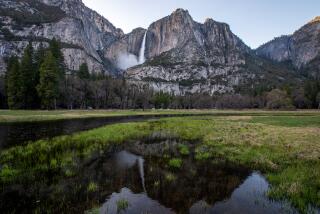Cameras Planned for Monuments on Mall
- Share via
WASHINGTON — The National Park Service will begin round-the-clock video surveillance at all major monuments on the national Mall by October, moving aggressively in the wake of last year’s terrorist attacks to tighten security around national symbols visited by millions of tourists each year.
Closed-circuit television cameras will be installed for the first time to monitor public areas in and around the Washington Monument and the Jefferson, Lincoln, Franklin D. Roosevelt and Vietnam Veterans and Korean War memorials, according to John Parsons, associate regional director for the service’s National Capital Region.
The decision, disclosed in testimony Parsons submitted for delivery to a congressional panel today, drew sharp questioning from members even before his appearance.
“I know they need to protect the monumental core, but this is a surprise to us,” said Rep. Constance A. Morella (R-Md.), chairwoman of the House Government Reform Subcommittee on the District, which called a hearing on the expanding use of electronic surveillance in the nation’s capital. “How long are they going to capture on these cameras every face of every person who is there? How long do they hold this material? Who will have access to it?”
Parsons’ statement said the U.S. Park Police would use cameras “only in public areas where there is no expectation of privacy” and “only for valid law enforcement purposes.”
A spokeswoman for Parsons said Thursday that no one was available to comment beyond the statement. A spokesman for the U.S. Park Police referred questions to the Park Service.
Civil libertarian groups expressed concern that video monitoring may discourage demonstrators, who for decades have gathered at the Reflecting Pool and elsewhere on the Mall to protest government policy on issues ranging from veterans benefits to abortion rights, civil rights and the Vietnam War.
“We have to ask the question, ‘Is there any real benefit to this?’ Evidence from the rest of the country and the rest of the world is the answer is no,” said Barry Steinhardt, associate director of the American Civil Liberties Union.
The Park Service announcement marks a dramatic step in the growth of U.S. law enforcement agencies’ use of video surveillance, a trend that has become increasingly controversial since the Sept. 11 attacks on the World Trade Center and the Pentagon.
More to Read
Sign up for Essential California
The most important California stories and recommendations in your inbox every morning.
You may occasionally receive promotional content from the Los Angeles Times.













